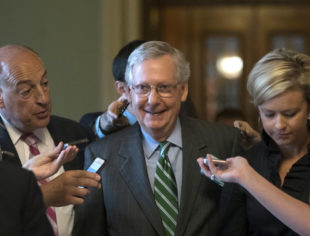The U.S. Senate on Wednesday rejected an attempt to repeal major parts of the Affordable Care Act, its second failure within 24 hours to unravel the 2010 law.
The vote on the proposal to repeal ACA provisions without providing a replacement was 45-55, with both Georgia senators – Republicans Johnny Isakson and David Perdue – voting in favor of the measure.

But Senate voting on an ACA overhaul is far from over.
GOP senators now may turn to the idea of a “skinny repeal,” a pared-down bill that would include eliminating the mandate on individuals to have coverage, and the requirement for employers with 50 or more workers to offer affordable insurance to their employees.
It’s expected also to propose repealing a tax on medical device makers.
The vote on the straight “repeal and delay’’ Wednesday afternoon followed a failure Tuesday evening to pass more comprehensive “repeal and replace’’ legislation that GOP Senate leaders had recently crafted. That vote was 43-57.

President Trump and congressional Republicans have pledged to get rid of the ACA, also known as Obamacare. They won a dramatic 51-50 vote Tuesdayafternoon – with Vice President Mike Pence’s acting as a tie-breaker – which began debate on health care legislation earlier Tuesday.
The unusual Senate legislative process being used, which even many experts admit is confusing, continued Wednesday. There was no clarity on what legislative avenues that Republican leaders planned to pursue.
Passing a “skinny’’ bill, though, would buy Republicans more time and a pathway to achieve an eventual agreement with House GOP leaders in a conference committee.
Convening the Senate on Wednesday morning, Majority Leader Mitch McConnell (R-Ky.) praised lawmakers for taking a “critical step” in opening the debate. He also signaled the legislative struggle ahead.
“This certainly won’t be easy. Hardly anything in this process has been,” McConnell said.
David Howard, health policy expert at Emory University, told GHN on Wednesday that Republicans, looking to pass a bill, can add financial incentives for the states of senators reluctant to pass legislation.

The impact of the individual mandate has been widely debated, Howard said. But getting rid of it, he added, “has to have at least some effect. It’s going to lead to a loss of coverage’’ and further deterioration of the individual insurance market.
Sen. Rand Paul, a Kentucky Republican, had pushed the amendment to repeal parts of Obamacare and delay a replacement plan for two years.
A straight-repeal effort was projected by the Congressional Budget Office to increase by 32 million the number of uninsured Americans. It would have repealed billions of dollars in taxes imposed under Obamacare to pay for expanding health coverage to millions more Americans.
The legislation would immediately end the ACA mandates for people to obtain insurance and for employers to offer it.

But it would keep the regulations on what insurers have to cover and the requirement that they not turn down sick people seeking coverage or base premiums on their health status. So the pool of people buying insurance would generally be older and sicker, prompting insurers to increase premiums.
“The rules of the insurance market would stay the same, without the inducement [for individuals] to buy coverage,’’ said Bill Custer, a health insurance expert at Georgia State University.
The Paul-backed amendment resembled a bill that passed the Senate in 2015 but was vetoed by President Barack Obama in early 2016.
A pared-down overhaul, eliminating the insurance mandates for individuals and employers, along with the device tax, would reduce revenues currently brought in by the ACA, Custer said. Congress would still have to find ways to pay for subsidies for individuals to afford coverage that would remain from the ACA, he said.
And without the requirement for individuals to buy coverage, more healthy people would choose not to do so. In turn, health insurers would have to raise rates if they stayed in the individual coverage market, Custer added.
The Blue Cross Blue Shield Association warned senators Wednesday that repealing the individual mandate without a replacement would disrupt insurance markets.
“If there is no longer a requirement for everyone to purchase coverage, it is critical that any legislation include strong incentives for people to obtain health insurance and keep it year-round. A system that allows people to purchase coverage only when they need it drives up costs for everyone,” the association said.

Consumer groups and organizations representing hospitals and physicians have urged Congress to pursue a bipartisan solution to health care. The American Medical Association’s president, Dr. David Barbe, said the Senate legislation “would harm vulnerable patients in every state.“
Much of the coverage losses in GOP legislation come from large federal funding cuts to Medicaid, the program for the poor and disabled that covers roughly 2 million Georgians.
AARP said Tuesday that it would “continue fighting to stop the Senate from passing any bill that increases costs, imposes an Age Tax, strips coverage from people, cuts Medicare, and cuts the Medicaid services seniors need to stay in their homes.”

Senator Perdue on Tuesday night blasted Democrats, who have unanimously voted against the ACA repeal legislation.
“They want a big government solution that gives them more power,” he said, according to the AJC. “They could care less about the very poor people they claim to champion.”
Perdue was dismissive of Democrats’ overtures for the two parties to work together to repair Obamacare, arguing they were “seven years too late,” the AJC reported. In 2010, Democrats controlled Congress and passed the ACA on party-line vote.
Republicans are using special budget rules to try to pass a repeal bill, so the debate is limited to 20 hours, and Democrats cannot delay it with a filibuster. Later this week, the Senate will hold what is known as a vote-a-rama, an exhausting marathon of amendment votes, the New York Times reported.
Custer, of Georgia State, said Wednesday that as the challenges to the ACA continue, the immediate future of the health insurance exchanges that it created is in limbo.
“There are a lot of decisions that need to be made for 2018 that can’t be made because of the uncertainty over this debate,” he said. (Here’s a recent GHN article on the Georgia insurance exchange facing an uncertain future.)

